- Home
- William Kennedy
Billy Phelan's Greatest Game Page 14
Billy Phelan's Greatest Game Read online
Page 14
“I heard that, George.”
“Do you know your name’s in the paper in some kind of mixed-up spelling?”
“I know that, too.”
“The cops were just at the house looking for you.”
“Me? What for?”
“They didn’t say. Peg talked to them. She asked if you were in trouble and they said no, but that’s all they’d tell her.”
“Who was it?”
“Bo Linder and somebody else in the car, maybe Jimmy Bergan. That’s his partner.”
“You see Bo?”
“He came to the door and told Peg for you to call the detective office.”
“He didn’t say why.”
“He said what I told you.”
“Right, George. Peg said you wanted to talk to me about a book.”
“There’s a fellow named Muller works over in Huyck’s mill and writes a hell of a good-sized book. I figured you might sit in while I talked to him about taking his layoff. Kind of break the ice a little. I don’t know him at all.”
“All right, George, I’ll do that. When you meeting him?”
“Tonight, one-thirty, quarter to two, when he gets off work. He’s coming here.”
“I’ll probably be here. If I go anyplace, I’ll try to be back by then.”
“Are you in trouble, Billy? Did you get mixed up with something?”
“No, George. I really don’t know what the hell they want.”
“You need money? Peg said you took a lickin’ today.”
“I’m all right on that.”
“I can rustle up some if you need it. What do you need?”
“Don’t worry about it, George. You need it yourself. I’ll be all right. I just got lucky in a card game.”
“You’re sure you’re not in trouble?”
“If I was in trouble, I’d be the first to know.”
“All you got to do is ask, whatever it is. And I mean that, even on the money if you’re in a jackpot. We’ll find it.”
“You’re a sweetheart, George. Have a drink, relax. I gotta finish my steak.”
“Isn’t that Jake Berman’s kid there?”
“Right, Morrie.”
“His name’s in the paper, too.”
“Right.”
“Jake’s father made me the first suit of clothes I ever had made.”
At the bar a man’s voice said, “That’s right, I said I hope they don’t catch them, whoever they are.”
The bar went quiet and Red Tom said, “That’s just about enough of that talk,” and he took the man’s beer away. Billy recognized the talker, name of Rivera, spic like Angie’s husband, a pimp. Red Tom poured Rivera’s beer in the sink and shoved his change closer to him on the bar. “I don’t want your business,” Red Tom said. But Rivera wouldn’t move. Red Tom came around the bar and grabbed his arm. Rivera resisted. Red Tom reached for the change and shoved it into his pocket. Then he lifted him with one arm, like a sack of garbage, lifted him off the bar stool and walked him out the door.
“The McCalls got everybody scared to do pee-pee,” Rivera said over his shoulder. “They think they can treat people like dogs.”
“Who’s that guy?” George Quinn asked.
“He’s a bughouse pimp. Gotta be bugs,” Billy said.
Red Tom closed the front door and moved in behind the bar.
“That kind of talk stays out in the street,” he said to all in earshot, looking at no one in particular. He pointed twice toward the door with one finger. “Out in the street,” he said.
When he’d finished his steak, Morrie Berman stood up and announced he was going off to get laid. Billy thought of tagging along with him but rejected the idea. He envisioned Angie in bed up at the Kenmore, waiting. He would go and see her. He was tired of gambling, tired of these people here. Maybe later he could come back and play some blackjack if the game was still running. Do that when he left Angie. If he left Angie. All right, he would see her, then leave her be and come down and play some blackjack. Billy still owed money. First things first.
“I got a date, Martin,” Billy said, pushing away from the table.
“That sounds healthful. Bon voyage.”
“I’ll keep you posted on the bankroll. We’re doing all right.”
“I know we are. You’ve decided not to go along with Patsy’s suggestion?”
“I listened all night. He didn’t say a goddamn thing.”
“What about the Bindy kidnap rumor? He doesn’t seem to remember it, but you do. Isn’t that odd?”
“That don’t mean anything.”
“Are you sure?”
“Aaahh,” Billy said, and he waved off the possibility and went out onto Broadway and turned up Columbia Street, past the old Satin Slipper, a hot place when Butch McHale ran it during Prohibition and now cut up into furnished rooms. He crossed James Street and was halfway to North Pearl when the car pulled alongside him, Bo Linder at the wheel, Jimmy Bergan with him. Billy. Bo. Been looking for you. Oh yeah?
“Bindy wants to talk to you.”
“Bindy? About what?”
“You ask him that.”
“Where is he?”
“Up at Patsy’s house.”
“Patsy who?”
“Patsy who my ass.”
“When’s he want to see me?”
“Two hours ago.”
“If this’s got something to do with Charlie, I don’t know anything.”
“Tell Bindy that. Get in.”
“No thanks.”
“Get in, Billy.”
“You pulling me in? Charging me with something?”
“I can get particular.”
“I’m under arrest, I’ll get in. Otherwise, I’ll take a cab. I know where Pasty lives.”
“All right, take a cab. We’ll follow so the driver don’t get lost.”
Billy walked to Pearl Street and at the corner looked up at the Kenmore, maybe at Angie’s room. She liked the front so she could look down and see people on Pearl Street after she and Billy had loved all possible juices out of one another. Billy didn’t see Angie in any window. She’d be asleep now, wouldn’t go on the town alone. Twelve-thirty now, hell of a time to visit the McCalls.
Two cabs stood in front of the Kenmore. Billy whistled and the front one made a U-turn and Billy got in. Bo Linder was idling at the corner, Bo the cop, a good kid when he was a kid. Good second baseman for The Little Potatoes, Hard to Peel. But what can you do with somebody who grows up to be a mean cop? Never was mean on second base. After he went on the force, Bo walked into Phil Slattery’s joint and shot Phil’s dog when it growled at him. Dog should’ve bit him on the ass.
“Conalee Street,” Billy told the cabbie.
Billy had never learned to pronounce Colonie Street the usual way. But people understood anyway. The driver moved north on Pearl Street, and Bo Linder swung out of Columbia Street and made it a parade.
Billy didn’t hate Colonie Street entirely, for it would have meant hating his mother, his greatest friends, Toddy Dunn, for one, even his ancestors. It would have meant hating the city the Irish had claimed as their own from vantage points of streets like Colonie. It was the street where he was born and had lived until adolescence, when he went off to room by himself. It was the street his sister, Peg, left with their mother when Peg married George Quinn and took a bigger and newer house in the North End.
Billy told the taxi driver to leave him off at the corner of North Pearl, and he walked up the hill toward Patsy McCall’s house. He passed the old Burns house, where the ancient Joe Burns always sat in the window, ten years in the window at least. Old Joe lived with his son, Kid, the sexton of St. Joseph’s Church for years until Father Mooney put him through undertakers’ school; and next door to them the Dillons: Floyd, a conductor on the Central, who put Billy and Peg and their mother in a Pullman with only coach tickets when they went to New York to see the ocean for the first time. Across the street was the vacant lot where the Brothers Scho
ol used to stand, and next to that the Daugherty house, gone, and then the other house: That house Billy did not now look at directly but saw always in his memory and hated, truly did hate that much of the old street.
And it was an old street even when Billy was born on it. It ran westward along the river flats from the Basin, that sheltered harbor that formed the mouth of the Erie Canal, and rose up the northernmost of the three steep ridges on which Albany was built: Arbor Hill. It rose for half a mile, crossed Ten Broeck, the street where the lumber barons had built their brownstones, and, still rising, ran another half mile westward to all but bump the Dudley Observatory, where scientific men of the city catalogued the stars (8241 measured and recorded for the International Catalogue as of 1883) from the top of the same hill on which Mike Mulvaney grazed and daily counted his two dozen goats.
The street took its name from The Colonie itself, that vast medieval demesne colonized in 1630 by an Amsterdam pearl merchant named Kiliaen Van Rensselaer, who was also known as the First Patroon, the absentee landlord who bought from five tribes of Indians some seven hundred thousand acres of land, twenty-four miles long and forty-eight miles wide, out of which a modest seven thousand acres would eventually be expropriated by the subsequent Yankee overlords to create the city of Albany.
Each power-wielding descendant of Van Rensselaer to assume the feudal mantle of the Patroonship during the next two centuries would maintain exploitative supremacy over thousands of farm renters on the enormous manor called, first, Rensselaerswyck, and later, The Colonie. Each Patroon would make his home in the Manor House, which rose handsomely out of a riverside meadow just north of the city on the bank of a stream that is still called Patroon Creek. Mickey McManus from Van Woert Street went rabbit hunting one day near The Patroon’s creek and shot a cow. Few can now remember that meadow or even where the Manor House stood precisely. It closed forever in 1875, when the widow of the Last Patroon died there, and it was later moved to make room for the Delaware and Hudson railroad tracks, dismantled brick by brick and reassembled in Williamstown as a fraternity house.
But long before that, North Albany, where Billy Phelan and Martin Daugherty both now lived, and Arbor Hill, where the McCalls and Billy’s aunts and uncles still lived, had been seeded in part with the homes of settlers who worked as servants and as farm and field hands for the Patroon. Billy Phelan’s great-grandfather, Johnny Phelan, a notably belligerent under-sheriff, was given the safekeeping of the Manor House as his personal charge after four rebellious prisoners barricaded themselves in their cell at the penitentiary and, with a stolen keg of gunpowder, threatened to blow themselves up unless the food improved. Johnny Phelan sneaked a fire hose to the door of their cell, opened the door suddenly, and drenched their powder with a swift blast. Then he leaped over their barricade and clubbed them one by one into civility.
Martin Daughterty’s grandmother, Hanorah Sweeney, had been the pastry cook in the Patroon’s kitchen and was famed for her soda bread and fruitcakes, which, everyone said, always danced off their platters and onto the finicky palates of the Patroon and his table companions, among them the Prince of Wales, George Washington’s grandnephew, and Sam Houston.
Arbor Hill and North Albany continued to grow as the railroads came in, along with the foundries, the stove works, the tobacco factory and the famous Lumber District, which started at the Basin and ran northward two and a half miles between the river and the canal. Processing Adirondack logs into lumber was Albany’s biggest business at mid-century, and the city fathers proclaimed that Albany was now the white pine distribution center of the world.
The North End and Arbor Hill grew dense with the homes of lumber handlers, moulders, railroad men, and canalers, and in the winter, when the river and the canal froze, many of them cut ice, fifteen thousand men and boys cutting three million tons from the Hudson in six weeks at century’s end.
They all clustered on streets such as Colonie to live among their own kind, and the solidarity became an obvious political asset. Not the first to notice this, but the first to ride it to local eminence, was the fat, bearded, Irish-born owner of the Beverwyck brewery, Michael Nolan, who in 1878 was elected mayor of the city Coming only three years after the death of the Last Patroon’s widow, this clearly signaled a climactic change in city rule: the Dutch and Yankees fading, the American Irish, with the help of Jesus, and by dint of numbering forty per cent of the city’s population, waxing strong. And eight years ahead of Boston in putting an Irishman in City Hall.
Nolan had lived on Millionaire’s Row, on the east side of Ten Broeck, two and a half blocks from Patsy McCall’s home on Colonie Street. Patsy, who could have lived like a millionaire but didn’t, was in the Irish descendance of political power from Nolan as surely as the Last Patroon had descended from the first; and was a descendant in style as well as power. When Nolan was elected, he swathed his brewery wagons and dray horses in red, white, and blue bunting and saw to it that Beverwyck beer was sold in every saloon in town. Nolan’s example was not wasted on the McCalls. Gubernatorial hopeful Tom Dewey revealed that in October 1938, Stanwix, the McCall beer, was sold in 243 of the city’s 249 taverns.
Billy Phelan knew the Patroon only as a dead word, Nolan not at all. But in the filtered regions of his cunning Irish brain, he knew the McCalls stood for power far beyond his capacity to imagine.
They were up from below. And when you’re up, you let no man pull you down. You roll your wagons over the faces of the enemy.
And who is the enemy?
It’s well you might ask.
Billy pushed the door bell.
Bindy McCall opened the door, smiled, and pulled Billy by the arm, gently, into the house, the first time Billy had entered Patsy’s home. The front hall, leading upstairs and also into both front and back parlors, reminded Billy of the hated house across the street, probably built from the same blueprints.
Bindy held Billy’s arm and led him into the front parlor with its thick oriental rug, its heavy drapes and drawn shades, where a scowling male ancestor of the McCalls looked down insistently on Billy: a powerful face above a neck stretched by a high collar and string tie, a face not unlike Patsy’s, who sat beneath it at a card table, shirtless, reclining in his blue bathrobe in a leather armchair; pads and pencils on the table beside a telephone. An old player piano dominated the room, where Patsy no doubt played and sang the dirties he was famous for, “Paddy McGinty’s Goat,” for one.
Billy had heard him sing that at the Phoenix Club in the North End on a Sunday years ago when the political notables of North Albany turned out for an election rally. Billy went just to watch the spectacle and barely spoke to anyone, never said, Hello Patsy, as he could have, as thousands did whenever the great leader hove into range. Hello Patsy. Billy just listened and never forgot the song and later learned it himself: Patrick McGinty, an Irishman of note, fell heir to a fortune and he bought himself a goat.
A panorama of a Civil War battle, one of Patsy’s well-known interests, hung in a gilded frame over the piano. A pair of brass donkeys as bookends, and with Dickens and Jefferson, a biography of Jim Jeffries, and canvases of Fifth and Eighth Ward voters sandwiched between the butt ends of the animals, sat on top of the piano. On an old oak sofa across from Patsy sat a man Billy didn’t know. Bindy introduced him as Max Rosen, Matt McCall’s law partner.
“You’re a tough man to find,” Bindy said. “We’ve been looking for you.”
“I wasn’t hiding. Just playing cards.”
“We heard about the holdup and what you did. You’re a tough guy, Billy.”
“How’d you hear about it? It just happened.”
“Word gets around. We also heard what you did in the Grand Lunch with that crazy kid.”
“You heard that, too?”
“That, too,” Bindy said.
“Listen, Bin,” said Billy, “I’m really sorry about Charlie.”
“Are you?”
“Sure I am. You got any word on him yet?”
/>
“We got a little. That’s why we wanted to talk to you.”
“Me? What’ve I got to do with anything?”
“Relax. You want a beer?”
“Sure, I’ll have a beer with you, Bin.”
Bindy, shirtsleeves rolled above the elbow, soup stain on shirtfront, no tie, wearing eyeglasses and house slippers, looked like somebody else to Billy, not Bindy McCall, the dapper boss of the street. He looked tired, too, and Patsy the same. Patsy stared at Billy. Max Rosen, in his suit coat, tie up tight to a fresh collar, also stared. Billy in the middle, a new game. He was glad to see Bindy come back with the beer bottle and glass: Stanwix.
“I heard you took a beating today with the nags,” Bindy said, pouring Billy’s beer.
“You hear what I had for breakfast?”
“No, but I could find out.”
“I ate alone, no witnesses.”
“There’s other ways.”
“Yeah.” And Billy took a drink.
“You know where your old man is?” Patsy asked.
“My old man?”
“Yours.”
“No. I don’t know.”
“I heard he was in town,” said Patsy.
“My father in Albany? Where?”
“I didn’t hear that. Somebody saw him downtown today.”
“Goddamn,” Billy said.
“You wanna see him?” asked Patsy.
“Sure I wanna see him. I haven’t saw him in twenty years. Twenty-two years.”
“I’ll see if I can track him down.”
“That’d be terriffic, Mr. McCall.”
“Call me Patsy.”
“Patsy. That’s a terrific thing if you can do that.”
“Maybe you can do something for us.”
“Maybe I can.”
“You heard that kidnap rumor about me,” Bindy said, sitting on a folding chair across the card table from Patsy. The card table Billy worked at was in better shape.
“I heard that last summer.”
“From who?”

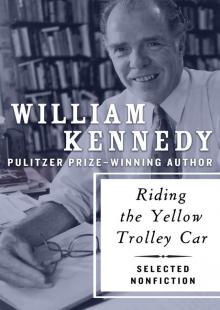 Riding the Yellow Trolley Car: Selected Nonfiction
Riding the Yellow Trolley Car: Selected Nonfiction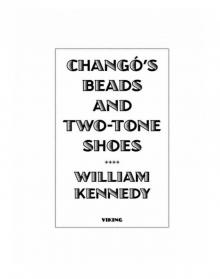 Changó's Beads and Two-Tone Shoes
Changó's Beads and Two-Tone Shoes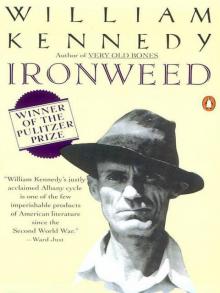 Ironweed
Ironweed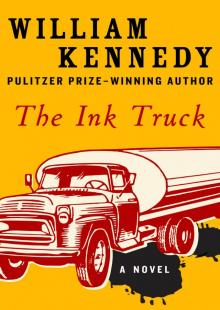 The Ink Truck
The Ink Truck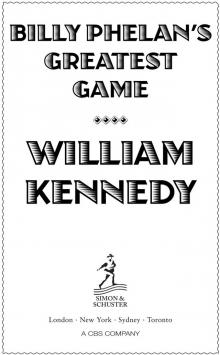 Billy Phelan's Greatest Game
Billy Phelan's Greatest Game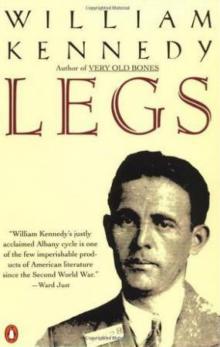 Legs
Legs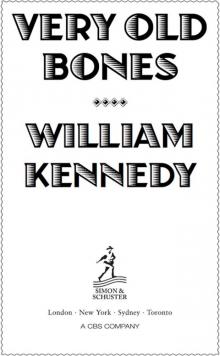 Very Old Bones
Very Old Bones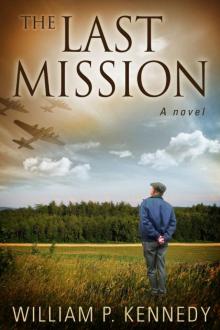 The Last Mission
The Last Mission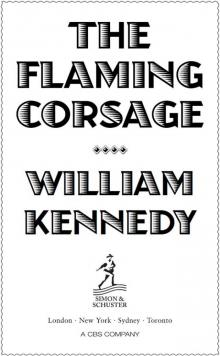 The Flaming Corsage
The Flaming Corsage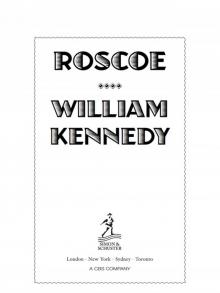 Roscoe
Roscoe Quinn's Book
Quinn's Book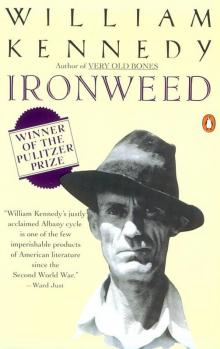 Ironweed (1984 Pulitzer Prize)
Ironweed (1984 Pulitzer Prize)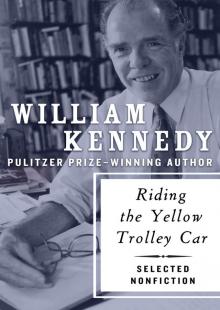 Riding the Yellow Trolley Car
Riding the Yellow Trolley Car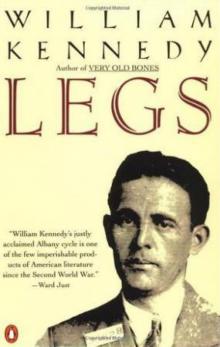 Legs - William Kennedy
Legs - William Kennedy